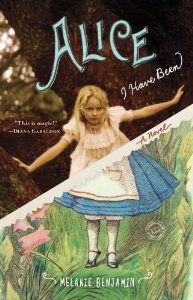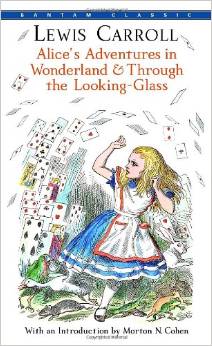We’ve been talking, in recent blogs, about the rewards of reading novels. I discussed my own preference for stories about characters involved in our culture’s current dilemmas, but my recent reading reminds me that stories of the past bring to life issues that never grow old. The book I’ll talk about today, Melanie Benjamin’s Alice I Have Been, does even more; it brings back the magic of childhood reading and revisits it with new eyes.
 Benjamin’s novel based on the life of Alice Liddell, the inspiration for Lewis Carroll’s Alice in Wonderland, is a gripping portrayal of a child’s love caught in adult passions, of a life that peaks far too early, and of a lifetime spent in recovery. Told by the aged Alice looking back, the child Alice’s innocence is tainted with knowledge of things to come. She is one of three protected daughters of an Oxford dean, high in the rarified air of English upper classes (Prince Albert was her brother’s godfather), forever rebelling against the restrictions imposed by such a position.
Benjamin’s novel based on the life of Alice Liddell, the inspiration for Lewis Carroll’s Alice in Wonderland, is a gripping portrayal of a child’s love caught in adult passions, of a life that peaks far too early, and of a lifetime spent in recovery. Told by the aged Alice looking back, the child Alice’s innocence is tainted with knowledge of things to come. She is one of three protected daughters of an Oxford dean, high in the rarified air of English upper classes (Prince Albert was her brother’s godfather), forever rebelling against the restrictions imposed by such a position.
The trio is taken for outings by Charles Dodgson (Lewis Carroll), and it is clearly Alice who lights up the life of this stuttering mand story teller. And he lights up hers. One “golden afternoon” when they are out rowing, he tells the magical story of Alice Underground, and she begs him to write it down, so she “can remain a child forever.” But ironically, this wish becomes all to true and becomes a curse. In the opening lines of the novel, Alice mourns, “But oh, my dear, I am tired of being Alice in Wonderland.” For her relationship becomes a scandal, food for gossip that in the hands of two men enamored of the “forever Alice” turns her adult love into tragedy.
As Melanie Benjamin says, this is the story of a man and a child, an artist and his muse. But the nature of their relationship, troubling to the reader from the start, haunts each of them for a lifetime. If there is any fault in this novel, it is that the last third, the years when Alice slowly comes to terms with her life, lack the electricity of the childhood and early adult years. But this change of pace is faithful to the nature of the tragedy itself, the life that reaches its height too early and must forever cope with the aftermath.


Comments are closed.